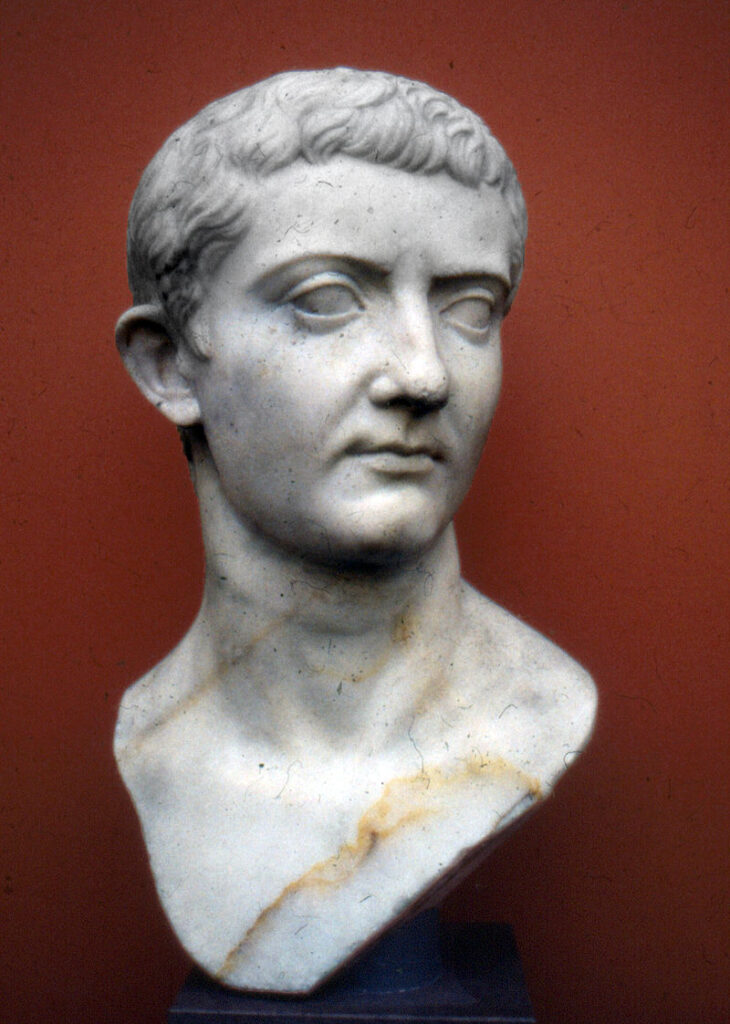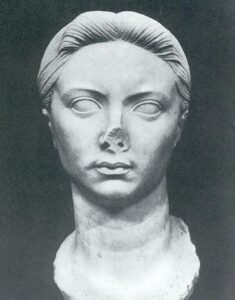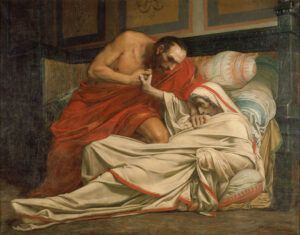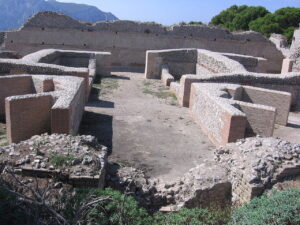Roman Emperors were men who wielded immense power in a wide variety of ways. Some were good military leaders. Some ruled fairly and openly, to the benefit of their citizens. Some were a destructive force at the center of plots, conspiracies, and murder.
Today’s protagonist was all of the above. In many ways a puzzling man, he was not born to become an Emperor, and when he did become one, he appeared reluctant, and spent almost half of his reign in self-imposed exile. This is the story of Tiberius, the second Roman Emperor.

Hardships and Difficulties
Tiberius Julius Caesar was born on November 16 in the year 42 BCE. This was two years after the assassination of Julius Caesar, and young Tiberius’ childhood would carry on under the shadow of the civil war that followed it. His father’s name was Tiberius Claudius Nero, and his mother was called Livia Drusilla.
Tiberius senior had been an officer under Julius Caesar but had sided with Mark Anthony. For this reason, the young family lived in exile, constantly in fear of having their hands, tongues or other body parts handed back to them by Caesar Augustus.
The Historian Suetonius, renowned for his prose and body odour, wrote this of Tiberius’ early years:
“His childhood and youth were beset with hardships and difficulties because Nero and Livia took him wherever they went in their flight from Augustus.”
For example, when the family was hiding in Naples, Octavian’s men broke into the city, and they had to make a quiet escape through the port. But the infant Tiberius cried so loud that he nearly betrayed the whole party.
After Naples, the family moved to Sicily and eventually to Sparta. but Augustus still would not let go, and during a night time escape Livia scorched her hair while running througha forest fire.
Luckily for the toddler, when he turned three, Augustus proclaimed amnesty for the conspirators. The family returned to Rome in 39 BCE, upon which Livia took a leaf from her husband’s book and pulled a switcheroo. She divorced Tiberius Nero and set her eyes on a new husband that could grant a rosy future for her and her son: Emperor Augustus.
Three months after their marriage, Livia delivered another son: Drusus. If for a moment you thought that the father was Octavian, that would make Livia a porcupine and Drusus a premature baby porcupine.
Tiberius’ baby brother had in fact been conceived with Tiberius senior. This is important: Livia had no children with Octavian, which meant that she had to work extra hard to secure the advancement of her sons. In point of fact, Octavian Augustus had been preparing for his own two grandsons, Gaius Caesar and Lucius Caesar to succeed him.
Gaius and Lucius were the sons of Augustus’ daughter Julia and Augustus’ right hand man Marcus Agrippa. Even though the parents of the two boys were alive and kicking, Augustus had decided to adopt them to better groom them for succession, a common practice at that time.
Livia’s efforts to supplant the order of succession seemed to pay dividends. In his early adolescence, Tiberius had the privilege to organise some gladiatorial games in the Forum. More importantly, he was allowed to ride on Augustus’ chariot at his triumph following the Battle of Actium.
At age 18, Tiberius was appointed quaestor, an entry level magistrate with the responsibility of collecting taxes or even recruiting soldiers in conquered territories. His skill and energy soon led to a military command.
A Tribunus and a Gentleman
In the year 22 BCE, a twenty-year old Tiberius was dispatched to Iberia as a Tribunus Laticlavius, an officer who served as second-in-command to the Legatus, the head of a Legion. In this function, he served in the northern region of Cantabria. The locals had rebelled against Rome, and Tiberius restored peace by decimating them.
This success in Spain granted him a more prestigious assignment: Tiberius was now put at the head of a Legion and sent to Armenia in 20 BCE to install a king friendly to Rome. The neighbouring Parthians, who would be modern-day Iranians, were not amused and threatened war. Tiberius displayed some good negotiating skills, agreeing to a compromise: a neutral king would rule Armenia, making it a buffer state between Rome and Parthia. In exchange, the Parthians would return three Legionary battle standards seized from Marcus Crassus at the battle of Carrhae.
Tiberius returned to Rome with three Eagles and was hailed as a hero. I did something similar yesterday. I returned home with three chickens and was hailed by my cats.

In 19 BCE Tiberius married his first wife, Vipsania, whom he loved dearly. And I realise that by calling her ‘first’ wife I sort of spoiled what’s coming next. According to Suetonius, Vipsania was the daughter of Marcus Agrippa. And who was Agrippas’ wife? Julia, daughter of Augustus.
I have done some math, here:
Julia was born in 39 BCE and she married Agrippa in 21 BCE. Age 18. So far, so good. Agrippa died in the year 12 BCE. In those nine years they were married, these two would have a total of five children, with one of them being Vipsania. Based on this timeline, Vipsania should have been 2 when she married Tiberius.
Suetonius does not offer clarity, so I am going to assume, and hope, that Vipsania was a daughter from a previous marriage, and that the name just ran in the family.
Another name that ran in the family was Drusus, Tiberius’ brother. When the newlyweds had a son, they, too, named their child Drusus. Because why choose a new name and miss a chance to complicate a historian’s work?
What historians do get right is the military campaigns. We know that Tiberius’ military adventures continued in 15 BCE, when he joined little brother Drusus in Gaul, or as Suetonius called it
‘the Long-Haired province.’
Here, feuds between the Gallic chieftains had caused considerable unrest, but Tiberius brought his own brand of Iberian peace. After that he fought in the Alps, Austria, and Germany. During these campaigns he ensured that the local population bend the knee to Rome, securing the northern borders of the Empire. During his campaign in Germany he captured some 40,000 German prisoners, whom he forcibly relocated in Gaul put an end to their constant revolts. Eight centuries later, Charlemagne would apply the exact same tactic to quash the Saxons.
All the while, mother Livia had continued her machinations to ensure the career progression of Tiberius. She had set her eye on the highest prize: succession to the throne of Emperor. Tiberius went along with these schemes, though we don’t know how much of it he participated in voluntarily.
In 12 BCE, Augustus agreed to consider him as a successor, but only if Tiberius would divorce his beloved wife and marry Julia, recently widowed. Tiberius was not happy about this. First, Vipsania was pregnant again, and he knew of Julia’s adulterous past. Even Augustus knew of her adulterous past. Heck, all of Rome knew of her adulterous past. Surely, men weren’t saints either, but hey, double standards are not a recent invention.
Julia, in fact, had even tried to seduce Tiberius while she was still married to his father-in-law Agrippa. Wait! This makes of Julia … his step-mother-in-law. Trying to seduce him? We are in full soap opera mode now!
The throne was the throne and eventually Tiberius relented, marrying Julia. Neither of them was particularly happy about this union, but initially, they tried to make it work.
Over time, Tiberius began to loathe her. When their first and only child died in infancy, he completely retreated from her.
Bumpy Rhodes
Tiberius did more than just retreat. He went into a voluntary exile on the island of Rhodes in 6 BCE. Julia went on to have an affair with Mark Anthony’s son, and this was politically dangerous. Eventually Augustus banished her from Rome in 2 BCE.
The relationship with Julia may have been the main reason for his exile, but even Suetonius is not sure. Another theory is related to Augustus’ grandchildren, Gaius and Lucius. They had now come of age, and Tiberius did not want to stand in the way of their lawful succession. The implication here is that he was a reluctant aspiring Emperor, to say the least.

During his self-imposed time in Rhodes, Tiberius visited the sick, worked as a magistrate, and mingled with the locals. He also attended philosophy lectures and debates, which could occasionally get loud and out of hand. During one of these debates, he was accused by a student of supporting one philosopher over the other. Instead of mounting a well-reasoned comeback, the normally-unflappable Tiberius went home, only to return with some guards. He had the loudmouth seized and sent to the gaol.
After the first few years of voluntary exile, Tiberius started regretting his decision. He longed to return home. But Augustus would not give his permission. Slanderous rumours had started circulating: apparently ‘The Exile,’ as he was now known, was plotting against the Emperor.
Eventually it was Gaius who convinced his grandfather to yield, and Tiberius was allowed back to Rome in 2 CE, on one condition: Tiberius renounce all interest in politics and lead an apolitical life.
This would prove to be difficult. He had barely set foot in Rome when Lucius, younger of the Emperor’s heirs, died of an illness while travelling to Iberia. A year and a half later, the older Prince, Gaius, died from wounds received in Armenia. Augustus was now left with only one male descendant, Agrippa Postumus, youngest son of Julia, and still a boy.
Four months later, Augustus formally adopted Tiberius, a clear sign that Tiberius would be his principal successor.
But for the moment, the Emperor had other plans in mind: Tiberius was needed in Germany. In the ensuing campaigns, the valorous General Tiberius quashed another rebellion, then moved to Bohemia, Pannonia and Dalmatia to deal with further insurrections.
When he was about to celebrate his well-won triumphs, news reached Rome of the terrible catastrophe at Teutoburg Forest, 9CE, in which Germanic tribes had annihilated the three legions of General Varo. Tiberius returned to Germany for two more expeditions, alongside his nephew Germanicus, but Augustus had wisely decided not to expand further into those lands.
A reluctant Emperor
In the year 14 CE, Tiberius was about to depart for yet another campaign when he was summoned by Augustus. The terminally ill Emperor asked him not to leave. It was clear to Tiberius that succession was around the corner: this was the moment that his mother Livia had been waiting for. Augustus clearly valued Tiberius administrative and military skills, yet he disliked his dour, sombre character. Tiberius had a quiet, inscrutable demeanour, but could unleash retribution when least expected. After their last meeting, Augustus gasped
‘”Poor Rome, doomed to be masticated by those slow-moving jaws!’
When Augustus died, apparently Tiberius and Livia did not break the news immediately. This is disputed, but Livia may have ordered the assassination of the young Agrippa, the remaining living grandson of Augustus. According to this version, after Livia got rid of the competition, Tiberius summoned the Senate and announced the death of the Emperor.
This meeting was a strange affair. Tiberius started a speech, but could not go on, claiming that
‘grief had robbed him of his voice and that he wished his life would also be taken’.
The Senate then read Augustus’ will, in which he made it clear that Tiberius was only his third choice of Emperor behind Gaius and Lucius. When the Senate formally asked him if he wanted to take the mantle, he visibly hesitated and remained silent.
He did accept eventually, becoming the new Emperor but leaving an impression that he was doing so only reluctantly.
This may be true. After all, it was Livia’s main goal, not his. He had proved to be more at ease with military rather than civilian life and was prone to seek isolation for long periods.
According to other interpretations, Tiberius was just trying to emulate Augustus. This is exactly what Augustus would have done — feign humility before accepting the highest possible honours.
As an Emperor, Tiberius’ first act was to rescind the allowance for hjs estranged wife Julia. The results were brutal, and poor Julia died of malnutrition as a result. This was a typical example of Tiberius’ ability to exact cold and calculated retribution on his enemies when he needed to.
His first years in power, however, were stable, prosperous and peaceful to Roman citizens. This may have been a consequence of Tiberius getting rid of his scheming mother Livia.
According to historian Cassius Dio, Livia did not miss a chance to declare that it was she who had made Tiberius emperor; not only did she wish to rule in equal terms with him, but she wanted her decisions to take precedence over his. Tiberius, who had once been a pawn in her hand, warned Livia not to interfere in the running of the state, removing her from public affairs. He refrained from having any future contact with her.
Tiberius initiated a series of public works, while always keeping an eye on expenses. He tried to maintain a good relationship with the Senate, respecting their authority. But his cold and impenetrable personality did not gain him any friends, and he became increasingly unpopular.
His polar opposite was his nephew, Germanicus, by now also his adopted son. Germanicus was popular, well-liked and apparently would have been the choice for Emperor in many a General’s mind. Tiberius had reason to fear a coup from Germanicus. The young officer, however, always voiced his support of Tiberius.
Bad Company
The drama escalated in 19 CE. On the 10th of October, Germanicus died in Antioch after a brief illness. His body showed potential signs of poisoning.
His wife was Agrippina the Elder, who was also a granddaughter of Augustus. Agrippina immediately accused Tiberius of having ordered the assassination of Germanicus. According to her, Tiberius had exploited the enmity between Germanicus and one Gnaeus Piso, a former governor of Syria who had been ousted by the young General. Piso was tried in Rome, and despite his appeals to Tiberius, he was forced to commit suicide. Forced suicide was a form of capital punishment sometimes used in Imperial Rome, another notable victim being philosopher Seneca during Nero’s reign.
Agrippina was not satisfied with Piso’s execution. She made it clear to the Emperor that with Germanicus dead, her three sons, Nero Caesar, Drusus Caesar, and Gaius Julius Caesar, also had a claim to the throne.
True to character, Tiberius did not react initially. He even took a liking to the boys. But in Suetonius’ version of the events, he took action at a later stage. He first brought about all sorts of false charges against the two eldest, Nero and Drusus. When they dared complain, he had them marked as public enemies by the Senate. This led to their incarceration and eventual death: Nero was forced to commit suicide and Drusus starved to death. The boy was so hungry that he had started eating his mattress.
Of Germanicus’ sons, only Gaius would survive, and he was actually welcomed into Tiberius’ household. Gaius used to wear a miniature uniform, while on campaign with his father, hence his surname: ‘little boots,’ or Caligula. We have a video about him, by the way, so go and watch it later! Just not quite yet. There are more conspiracies coming.
The death of Germanicus brought a change to Tiberius’ personality; according to Cassius Dio, he became increasingly cruel
“… toward those who were suspected of plotting against him he was inexorable…slaves were tortured to make them testify against their own masters…”
Suetonius agreed with this change of demeanour:
“Tiberius did so many other wicked deeds under the pretext of reforming public morals, but in reality (it was) to gratify his lust for seeing people suffer.”
During this period, Tiberius became best buddies with an officer of the legion, Lucius Aelius Sejanus. Eventually, he appointed him Prefect, or commander, of the Praetorian Guard. This was the elite corps tasked with protecting the Emperor and his family. Sejanus grew in standing, becoming the chief adviser and confidante of Tiberius.
Tiberius gradually withdrew from the day to day running of the Empire, delegating many decisions to Sejanus.
Sejanus started seeing himself as the next Emperor and began to view Drusus, son of Tiberius and Vipsania, as a natural rival. In order to strike at him, Sejanus hit Drusus where it hurt the most: he began an affair with his wife, Livillia.
Drusus died in 23 CE by poisoning. It is very likely that he was killed by Sejanus and Livillia. This was not immediately evident, though, and the grieving Tiberius launched a harsh investigation to find the culprits. He became so enraged and ruthless that according to Suetonius he once mistook a friendly visitor from Rhodes as a key witness. He had him seized, interrogated, even tortured. When it was clear that the poor guy had just popped in to say ‘Ave’
{Ahh-Vay}, Tiberius had him executed to silence the scandal.
By 25 CE Sejanus had grown the strength of the Praetorian Guard to 12000 men and had golden statues of him erected around Rome. Next, he embarked on a series of treason trials to weed out any possible opposition. By this point, many Romans were living in fear.
At Livillia’s insistence, Sejanus divorced his wife and left his children; the couple then appealed to Tiberius for permission to marry, but Tiberius denied the request.
A Second Exile
Tiberius grew more and more distant from the affairs of the Empire. As he had done years before, he decided to withdraw into a second virtual exile, this time moving to the isle of Capri in 26 CE.
This did not quell his thirst for blood, according to Suetonius. I should specify that Suetonius himself used as sources the memoirs of Agrippina the Younger. Who was she? She was the daughter of Germanicus, so her writings may have been kind of anti-Tiberius … During the years in Capri, Tiberius had countless alleged conspirators thrown to their death from the rocks high above the sea. In one famous incident, a fisherman with a huge mullet visited Tiberius. Not the hairstyle, the fish. He was bringing the fish as a present. Tiberius was so scared and paranoid that he ordered his guards to rub the fisherman’s face with the mullet. The scales skinned it raw, and the poor guy shouted:
‘Thank Heaven, I did not bring Caesar that huge crab I also caught!’
Tiberius sent for the crab and had it used in the same way.
In the year 29, news reached Tiberius that his mother Livia had died, aged 86. She had been suffering from a long illness, but Tiberius had neve

r visited her. Even in death, he basically ignored her, and made no arrangements at all in her honour, except for the bare minimum: a public funeral … which he did not even attend! This is according to historian Tacitus – another guy we should take cum grano salis
[Caption: with a pinch of salt]
As he was staunchly pro-Senate and wary of Imperial power. He wrote that Tiberius excused himself from the funeral
“… on the ground of the pressure of business.”
Two years later, Caligula moved to Capri to live with Tiberius. If the reports from our ancient historians are true, then we could say that the future mad ruler Caligula may have learned a trick or two from the Tiberius Playbook of Cruelty. But in some cases, his ruthlessness may have had a point. In the same year, 31 CE, Sejanus and Livillia announced their betrothal – they would go ahead, with or without Imperial permission.
Livillia’s mother, Antonia Minor, wrote to Tiberius and informed him that the lovebirds had a plan to murder him and young Caligula. Tiberius rushed back to Rome and appeared before the Senate, demanding that Sejanus be subject to trial.
Sejanus was lured to the Senate and forced to answer to the accusations of conspiracy to commit murder. Under the Emperor’s influence, it was a swift trial: the Praetorian was found guilty and condemned to death. Not just any death.
Sejanus was strangled and thrown onto an assembled mob, who tore his limbs apart and fed his remains to the dogs. His sons and followers were also executed. Livillia was also put to death, with what I now believe to be Tiberius’ favourite modus operandi: starvation. Her own mother Antonia made sure she did not eat anything.
Legacy
The reclusion of Tiberius in Capri became a full-time status in his later years. Now in his 70s and increasingly ill, he attempted to return to Rome only twice after the trial of Sejanus. In the first occasion, he was travelling by trireme up the Tiber, but upon seeing the City walls from a distance, he ordered the captain to return to Capri. In the second occasion, he was travelling by land when he noticed that his pet snake had been eaten alive by ants. Interpreting this as an omen of a mob rebellion, he retreated once again.

Tiberius died on March 16, in the year 37 CE, at the age of 77. It may have been illness; it may have been poison administered by a new Praetorian prefect, with help from Caligula. Upon hearing of his death, the Romans, according to Suetonius, yelled
“To the Tiber with Tiberius”
Cassius Dio, in a more balanced account, simply wrote:
“Thus Tiberius, who possessed a great many virtues, and a great many vices, and followed each set in turn as if the other did not exist, passed away in this fashion on the twenty-sixth day of March.”
Apart from getting the date wrong, Cassius summarises the lights and shadows of the reign and personality of Tiberius. As we have seen today, Tiberius had a cold and calculating intellect. He could be a good leader of men in the field, but was often uneasy when it came to networking with the political class. He alternated periods of intense, paranoid and psychotic activity with total withdrawal from society. He was a puzzle within a mystery to his contemporaries, but can we do something more to better understand him? Two of his successors, Caligula and Claudius, have been analysed and diagnosed as potentially having a bipolar disorder. Tiberius, Caligula and Claudius were all related, having common ancestors in Livia and Tiberius senior. Considering that this disorder can be hereditary, could it be possible that also Tiberius had the same affliction? I would not offer any conclusion — I’ll leave it to you in the comments.
I do hope you like today’s video. Please like, share and subscribe and as usual … thank you for watching!



